InsiderNJ Fights of the Week
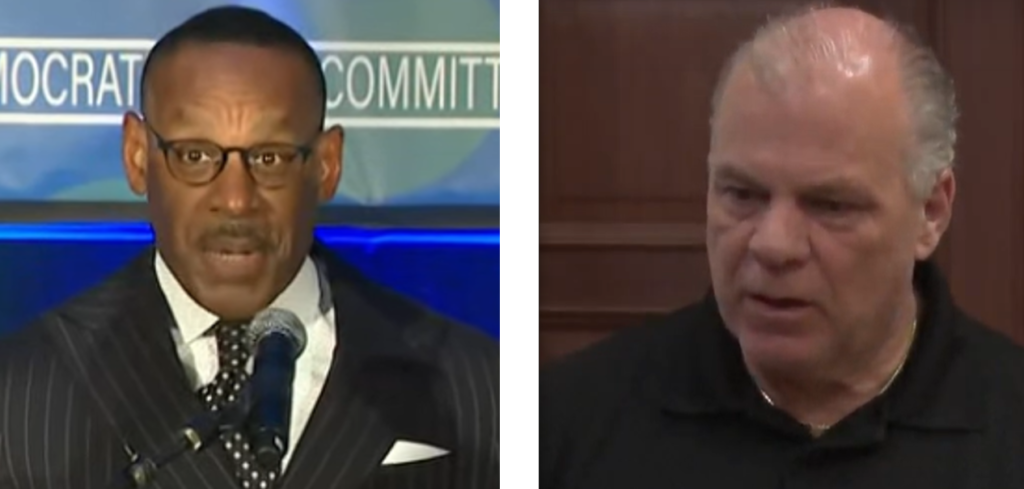
Intraparty rivalry - and a taste of more to come, both on the campaign trails and in the halls of Trenton - characterized some of the key political collisions and fights this week in New Jersey.
[caption id="attachment_129958" align="alignleft" width="150"]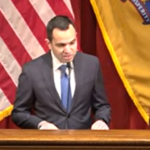 Platkin[/caption]
Platkin[/caption]
One can identify it in the fast accelerating GOP Primary in CD-3, in Democrats' head-rolling theatrics on the legislative redistricting commission (see below), or even in the politically artful press release of a seasoned Democratic Party veteran like former Governor (and sitting state Senator) Dick Codey when he reacted this week to Governor Phil Murphy's nomination of former counsel Matt Platkin to serve as the state's next attorney general:
“I have known Assemblyman John McKeon for over 30 years," wrote Codey. "He is one of the finest
[caption id="attachment_16216" align="alignright" width="300"] Codey and U.S. Rep. Mikie Sherrill.[/caption]
Codey and U.S. Rep. Mikie Sherrill.[/caption]
people I know. He has an exceptional grasp of the law and ability to work with people. Jamel Semper has proven himself as one of the best during his time in the Essex Prosecutor’s Office, and now as Chief of the Organized Crime and Gangs Unit in the U.S. Attorneys’ Office. Acting Attorney General Bruck, in his short time, has earned the respect of the people who work in that office and the public, as well as the State’s twenty-one county Prosecutors.”
Not a single mention of Platkin. Codey simply praised those men - including his own long-time slate mate McKeon - who might have scored the job. The stinging words have left more than one insider to speculate that Codey might give a hard look at the Platkin nomination and have a hankering to exercise a scolding show of senatorial courtesy.
That said, the week also revealed those core contradictions between parties, and if Codey revealed much by what he didn't say, Republicans didn't hold back, as state Senator Kristin Corrado (R-40) demonstrated a willingness to get tough. Platkin served as Governor Murphy’s chief counsel at the start of the pandemic when Murphy first declared a State of Emergency and Public Health Emergency. “On emergency powers, we need someone who shares the views of New Jerseyans that it’s time for Governor Murphy to give it back,” Corrado said.
More on that - and the other most politically engaging fights of the week - below.

Bob Healey versus Ian Smith
The Democrats' winning redistricting map made the Third Congressional District more favorable to
[caption id="attachment_104621" align="alignright" width="150"] Kim[/caption]
Kim[/caption]
incumbent U.S. Rep. Andy Kim (D-3), mostly by removing Ocean and giving him towns in Mercer and Monmouth. But Kim's improved reelection fortunes have not stopped Republicans from using the primary as a cauldron for discovering the GOP's true character.
Executive co-chairman of the Viking Group, Healey posted respectable fundraising numbers early and has almost a half a million dollars in the bank as the self-identified "philanthropist" seeks to fulfill the role of solid suburban citizen. During the lockdown, gym owner Smith (pictured, above) became the angry face of South Jersey business people tired of Governor Phil Murphy telling them what to do during the pandemic.
Healey and Smith will presumably have time to define themselves on the issues at the core of a GOP still
[caption id="attachment_130036" align="alignright" width="180"] Healey[/caption]
Healey[/caption]
struggling to get out from under the yoke of former President Donald J. Trump. In the meantime, they embody divergent types: Healey the clean-cut, conventionally grounded businessman and investor, Smith the bearded Fox News agitator.
If they share at the very least a wild youth (Healy is an avowed former punk rocker), Smith at his campaign kickoff this week acknowledged a past tormenting sin.
“I’m going to tell you about a terrible tragedy,” Smith said. “When I was 20 years old, I woke up after a night of drinking in my college apartment, got in my car and moments later I was the sole cause of a motor vehicle accident that took the life of a young man named Kevin. My actions broke the hearts of a family and an entire community, and that’s something that they’ll never fully recover from. There are many people who are still hurt and angry with me for this, and I cannot blame them for feeling this way. The guilt from this accident is something I face everyday.”
Healey was not in a forgiving mood.
“Republicans have a historic opportunity to stop Joe Biden’s and Nancy Pelosi’s radical agenda and win back control of the House this November, but that won’t happen if we nominate unfit and unelectable candidates like Ian Smith,” said Healey Campaign Manager Theresa Velardi. “The people of Burlington, Monmouth and Mercer Counties will never elect someone who was convicted of killing an innocent teenager while driving drunk and in possession of marijuana and hypodermic needles. Nor are they going to elect someone who openly embraces fringe conspiracy theories about the 9/11 terrorist attacks being perpetrated by our own government,” added Velardi, who was six-years old when her own father was killed in the attacks.
They hadn't yet dived into those cross-currents of a party wrestling with its collective soul, let alone individual agonies. It was only the beginning of Healey versus Smith.

LeRoy Jones versus Steve Sweeney
Republicans aren't the only ones trying to discover who they are, as an ongoing North versus South rivalry finds two players in the Democratic Party still engaged in a statewide taffy pull.
Democratic State Party Chairman LeRoy Jones (pictured, above) and former Senate President Steve Sweeney (D-3) seldom got along. The troubles between them probably started in 2016, ahead of the 2017 gubernatorial election, when Jones - in his role as chairman of the Essex County Democratic Committee - embraced (along with his fellow party chairs in Hudson, Passaic and Bergen) the candidacy of Phil Murphy over Sweeney. Then he cut his own deal for the state chairmanship without conferring with The South (otherwise known as party power broker George Norcross III and Sweeney).
Relations between the two Democratic leaders worsened.
Still occupying the senate throne, Sweeney didn't bother showing up at Jones' swearing-in as chairman of the state party.
Then the burly ironworker lost reelection to trucker Ed Durr (who incidentally enlisted the campaign manager know-how of veteran operative Steve Kush, now running Ian Smith's campaign, above).
Never saying it publicly, Sweeney had to have felt not only felt the radioactivity of his own region of the
[caption id="attachment_126366" align="alignright" width="300"]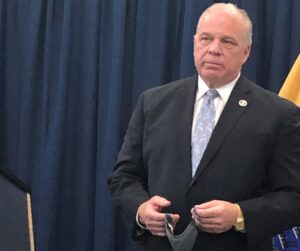 Former Senate President Sweeney[/caption]
Former Senate President Sweeney[/caption]
state turning a deeper pulsating red around him, but also the sting of that natural sense of superiority northern Democrats feel as a consequence of having big insulating pluralities. His old foe, Murphy, won on the strength of Jones' home county racking up the numbers, while South Jersey strangled Sweeney out of commission as Republicans strengthened during the Trump era.
Sweeney ejected from office didn't deter Norcross from trying to undercut the congressional redistricting process in the 11th hour, signaling another round of hostility from the South.
Emboldened by the fact that Sweeney lost his own reelection bid, and unwilling to indulge the devilish and diabolical designs of a faded south, Jones gave Sweeney the have-ho from the legislative redistricting commission.
Sweeney subsequently sued to get reinstated, arguing that his absence would deny the commission a legitimate representative from the southern region of the state.
It didn't work out for him.
From InsiderNJ columnist Fred Snowflack:
William Tambussi, who represented Sweeney in state Superior Court, Mercer County, argued that Jones’ action was improper because Sweeney had been appointed to a “fixed term” – ironically by Jones back in the fall of 2020. And he said that term should run to March 1 when the commission is scheduled to complete its work.
Not so, said the judge.
“I don’t see it,” he said in reference to the fixed term argument. “I don’t see it in the Constitution.”
Jones had won, his power projection platform of the north jutting above a badly mangled southern Democratic Party. But the tentacles of the Norcross-Sweeney wing of the party stretched into multiple orifices around New Jersey. Certainly Sweeney - the longest serving senate president in state history - had his own reach into the senate caucuses, and if Jones girded himself with raw numbers and the depletions of Sweeney's base, the former senate strongman would no doubt be leaning on his cloakroom allies to reassert relevance.
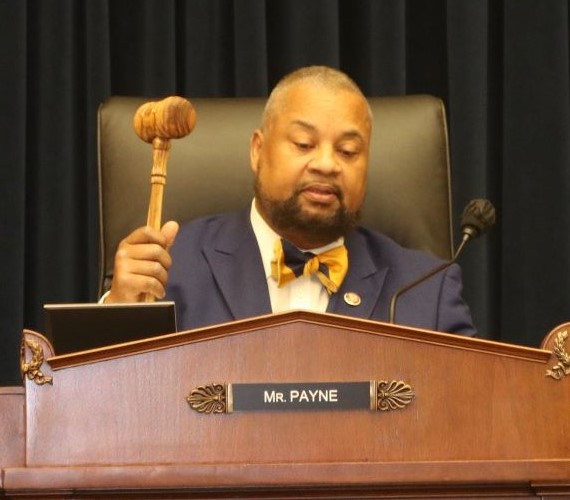
Donald Payne, Jr. versus Imani Oakley
While Republicans Healey and Smith go at it this year in the 3rd District down south, look for progressive Democratic challenger Imani Oakley to continue to aggressively go after incumbent U.S. Rep. Donald Payne, Jr. (D-10)(pictured, above) at the heart of Democratic Essex County up north.
An occupant of the Alexandra Ocasio Cortez wing of the Democratic Party, Oakley - a community activist who worked for Working Families - intends to give Payne fits.
Example:
"In March 2020, Donald Payne Jr.'s car got a parking ticket—and he got pretty mad. Payne Jr. argued
[caption id="attachment_125584" align="alignright" width="300"] Oakley[/caption]
Oakley[/caption]
with the officer—and then the officer 'mysteriously' faced alleged retaliation at work," Oakley wrote this week in a fundraising letter. "I wouldn't blame you if you thought this was far-fetched! But political retaliation is business as usual in the Essex County Sheriff's Office. This is the same Sheriff's office that is responsible for the Essex County Jail, which is known for horrible conditions for both prisoners and ICE detainees. This is the same Sheriff Donald Payne Jr. took money from last quarter. And while we're talking about intimidation, corruption, and mismanagement, some of you may remember that my Mom caught some folks snooping around my driveway trying to take a picture of our cars. We fully suspect this was a machine operative trying to dig up dirt."
Now, Oakley still has a tremendous disadvantage in Essex, where the Democratic Party line is particularly strong, given the billion dollar patronage machine otherwise known as county government. A judge's favorable ruling in a pending progressive lawsuit could conceivably abolish the party line system, but such a judgement, and the timing of its rendering, seem like a longshot.
Thus, Oakley in full-blown AOC mode, knows she needs to haul Payne into a fistfight - and inspire where the establishment has - in her view - failed to fulfill the progressive cause. Barack Obama did, after all, defeat Hillary Clinton off the line in Essex in 2008 - 74.5K to 56K. But that was Obama. Moreover, the Payne name scared away a progressive challenger that same year, as Payne Jr.'s father, the late U.S. Rep. Donald Payne, ran unopposed on the line with Clinton. Payne also intends to use his pulpit as chairman of the Subcommittee on Railroads, Pipelines, and Hazardous Materials for the House Committee on Transportation and Infrastructure to underscore bedrock in the 10th District under his and President Joe Biden's watch.
“The new, $1.2 trillion Infrastructure Investment and Jobs Act is going to create opportunities for minority and women-owned businesses nationwide,” said Payne, Jr., who earlier this year assumed the chairmanship of the Subcommittee on Railroads, Pipelines, and Hazardous Materials for the House Committee on Transportation and Infrastructure. “We must not let discrimination in federal contracting deny them their right to participate in these infrastructure projects. As Chairman of the Rail Subcommittee, I will continue to work to make the process of how we award federal passenger rail projects more equitable and transparent for all American businesses.”
The bill also makes critical investments in rail projects, among them the long-delayed access corridor to the region’s core, or the Gateway Tunnel, in a district where only two towns – Irvington and Hillside lack train stations.
Of course, Oakley will take the congressman to task over the failure of the comparatively moderate Biden and federal Democrats to pass the President's other key piece of legislation, the one coveted by progressives: Build Back Better, a $2 trillion-plus bill that passed the House but failed to get past West Virginia Senator Joe Manchin.
Moving to deflate that argument and deoxygenate Oakley, while demonstrating the power of incumbency and his good relations with a core progressive constituency, the Payne Campaign today rolled out the endorsement of the Communications Workers of America (CWA).
From that endorsement:
"He [Payne] voted in favor of President Biden’s Build Back Better Act which included funding for provisions of the Protect the Right to Organize (PRO) Act. The BBB Act includes funding for the National Labor Relations Board to enforce workers' rights and levy fines of up to $50,000 on employers for each unfair labor practice they commit."
Up against the red-shirted CWA, Oakley has undertaken a bruising challenge by running against the formidably connected Payne. But she comes from grassroots organizing and will attempt to connect with that part of the party tired of the machinations of the establishment and distrustful of too many appeasing moves away from .
It is, indeed, a conflict.
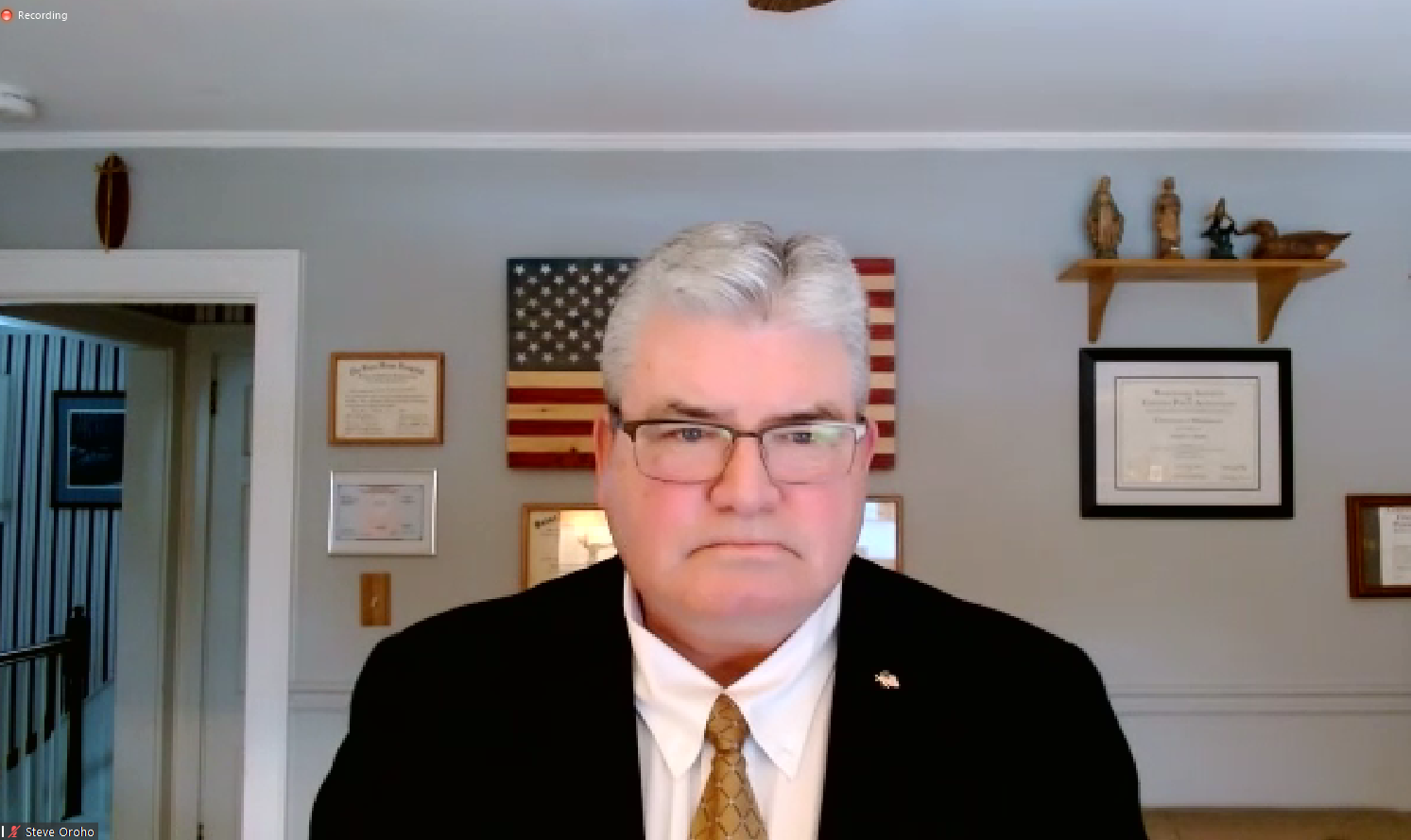
Steve Oroho versus Phil Murphy
If Democrats wants to Build Back Better, state Senate Republican Leader Steve Oroho this week said he simply wants Governor Murphy to "give it back," giving an opportunity for New Jerseyans to "tell Governor Phil Murphy in a unified voice to give back everything he has taken from them over the past two years."
“Governor Murphy has taken so much from New Jerseyans since the start of the pandemic,” said Oroho. “He’s taken money, he’s taken power, and he’s taken rights, choices, and freedoms from every single New Jerseyan. We’re going to help New Jerseyans to send him the message that it’s time to Give It Back.”
[caption id="attachment_125854" align="alignleft" width="300"]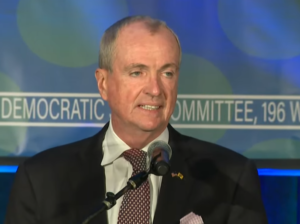 Murphy[/caption]
Murphy[/caption]
Senate Republicans will engage the public to join the Give It Back initiative through traditional and social media, direct outreach, and an online petition where New Jerseyans can join the movement and demonstrate their support.
Murphy will no doubt respond that the pandemic has taken a lot from not only us, and the country but the planet. The governor can point to his history-making reelection last year as affirmation of his policies, including lockdown orders and mask mandates - but Republicans feel buoyed by the fact that GOP challenger Jack Ciattarelli came within a paltry three percentage points of beating Murphy, in a state with a million more registered Democrats than Republicans.
Having watched the red region of New Jersey devour his old friend Sweeney, Oroho sees an opportunity.
If Murphy playing too far to the left (the governor will argue nonsense, he merely wanted to keep New Jersey safe) helped finish off Sweeney, Oroho sees a chance to continue to use the cudgel of Murphy to batter Democrats, maybe in time to help the GOP notch some more wins in the 2022 election cycle, but more importantly, and with the fertile opportunity presented by the Jones-South Jersey rift, to score some state Republican legislative victories.

Republicans versus Democrats
Despite all the intraparty rancor, hurt feelings and turmoil, ultimately the two parties found themselves perhaps best defined this week by a lawsuit, which went the way of Democrats over the GOP.
From Politico's Matt Friedman:
"The New Jersey Supreme Court on Thursday voted 5-0 to side with Democrats and dismiss a GOP (former GOP State Party Chairman [and redistricting commission co-chair] Doug Steinhardt pictured, above) lawsuit that asked the court to remand the map to the redistricting commission for further consideration and require the tie-breaker commissioner, former Supreme Court Justice John Wallace, to recuse himself."
Given Norcross' late game shenanigans during congressional redistricting, and the depth of disaffection between Sweeney and the party chairman, South Jersey Dems probably wouldn't have thrown a temper tantrum had the Republican lawsuit forced the commission back to the table.
And that's even with the gains for Kim (see above).
But trying to encompass the statewide party designs of his party, even within the context of all the internal strife, Democratic State Committee Chairman Jones released the following statement on the New Jersey Supreme Court’s dismissal of the Republican lawsuit on the Congressional Redistricting process:
“The New Jersey Supreme Court’s ruling dismissing the Republican challenge to the adopted Congressional redistricting map reinforces what we have said throughout this matter — that the map is constitutional, that the process was fair and that the outcome is in the best interests of the diverse communities that make up our state. Now we look forward to working with our congressional candidates, party leaders and grassroots advocates to win these races and make sure New Jersey does its part as one of the states that is most critical to maintaining Democratic control of the House of Representatives.”
[caption id="attachment_120151" align="alignnone" width="5184"] Chairman Jones[/caption]
Chairman Jones[/caption]





